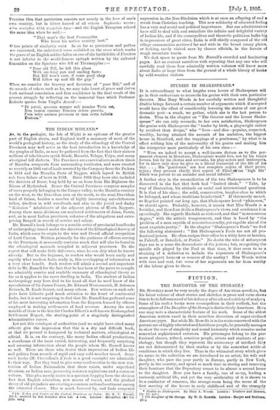STUDIES IN SHAKESPEARE.*
Ii is extraordinary to what lengths even lovers of Shakespeare will go in their endeavours to reconcile his genius with their own particular theories. Miss Mary Woods in her carefully written and thoughtful Studies brings forward a certain number of arguments which if accepted would have the effect of considerably lowering the status of our great dramatic poet—a result, we gather, which she is the last person to desire. Thus in the chapter on "The Greater and the Lesser Shake- speare " she can only reconcile, to her own satisfaction, Shakespeare the genius with Shakespeare the "trader by birth, a playwright rather by accident than design," who "lives—and dies—popular, respected, wealthy, having attained the summit of his ambition, the biggest house in Stratford, and the trappings of a gentleman," by what is in effect robbing him of the universality of his genius and making him the interpreter more particularly of his own class :—
"Were we indeed to accept a well-known dictum as to the per- manent clement in literature, Shakespeare would live, not by his tragio heroes, but by his clowns and servants, his play-actors and innkeepers, for in these only does he give us a literal transcript of the life of his day. . . . His ' gentlemen ' are less complete copies of their proto- types; they present chiefly that aspect of Elizal ets'aan 'high life' which was patent to an outsider and social inferior."
A further step in the reconciliation of the two Shakespeares is to be discovered in the fact that both had "limited ideals." "Take, by way of illustration, his attitude on social and international questions. It is that of his class ; the solid, conservative, burgher-class to which he belonged, and whose traditions he inherited." If this merely meant, as Bagchot pointed out long ago, that Shakespeare loved "plain men," we should agree. Probably, however, it means that Miss Woods is a Socialist, and therefore dislikes Shakespeare's views, and condemns h:m accordingly. She regards Macbeth as endowed, and that" in no common degree," with tho artistic temperament, and thus is faced by "the problem of a man capable of remorseless cruelty, yet capable also of the most exquisite poetry." In the chapter "Shakespeare's Fools" we find the following statement : "But Shakespeare's Fools are not all pro- fessional jesters. He often assigns their office to a witty hero or heroine, as Falstaff, or Benediek, or Portia." No doubt the wits of subsequent days are in a sense the descendants of the jesters ; but, recognizing the specific role played by the Fool at that time, it does seem to us a straining of a definition to include the exponents of Shakespeare's more pungent humour IS wearers of the motley! Miss Woods writes with care and zeal, Lilt some of her arguments are far from worthy of the labour given to them.










































 Previous page
Previous page